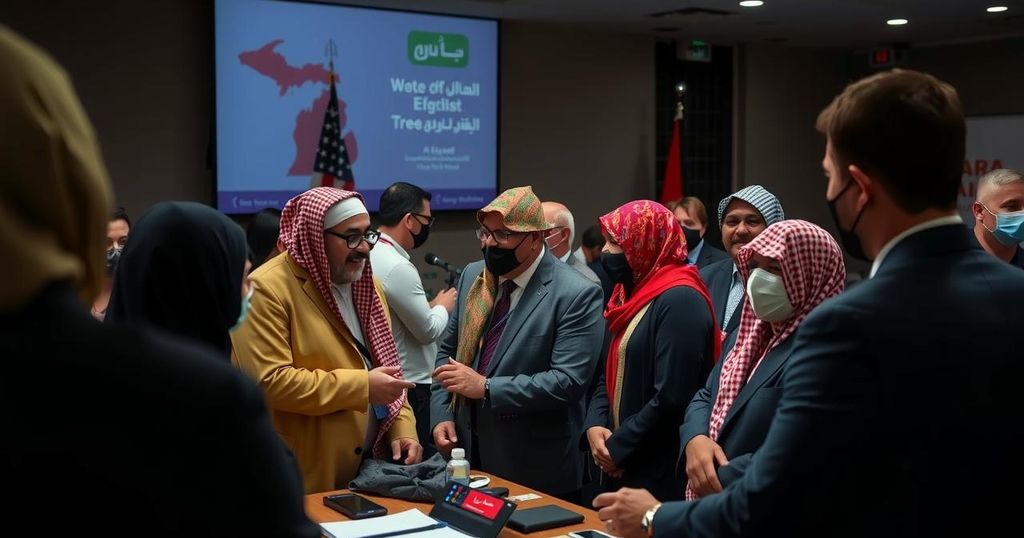Arab American voters in Michigan are increasingly leaning towards Donald Trump due to disillusionment with the Democratic Party’s support for Israel amid conflicts in Gaza and Lebanon. Activists are vocal about their frustrations, asserting that the community’s votes have been taken for granted by Democrats. Trump’s outreach in areas with significant Arab populations indicates a growing electoral bloc willing to support him in hope for change in U.S. foreign policy, despite his controversial past. This shift raises questions about the future political dynamics within the Arab American community as they seek to assert their influence.
In recent months, an increasing number of Arab American voters in Michigan are shifting their support towards Donald Trump ahead of the United States presidential election. This trend appears to be motivated by disillusionment with the Democratic Party, particularly with Vice President Kamala Harris, regarding the administration’s unwavering support for Israel during the ongoing conflict in Gaza and Lebanon. Activists like Samraa Luqman express frustration at the Democratic Party’s previous treatment of the Arab vote, indicating a belief that their support has been taken for granted. This disenchantment has created a unique electoral bloc termed “Arab Americans for Trump,” signaling a significant political realignment. Many community members are willing to overlook Trump’s history of anti-Muslim rhetoric, viewing their support as a necessary gamble in hopes of achieving any change regarding U.S. foreign policy and its impact on the Middle East. Trump’s recent campaign activities in Detroit and Dearborn, areas with substantial Arab populations, reflect this outreach initiative. He engaged with local Arab Americans, addressing their concerns regarding conflicts in the Middle East and presenting himself as a viable alternative to Harris. During these engagements, Arab American supporters articulated their belief in Trump’s potential to halt violence in the region, despite acknowledgment of his previous actions that have sparked conflict. This shift contrasts sharply against the backdrop of longstanding ties the community has had with the Democratic Party, a connection strained by the Biden administration’s maintained policies supportive of Israel. Key figures, such as Dearborn Mayor Abdullah Hammoud, have vocally opposed Trump’s candidacy, criticizing the Republican approach while emphasizing the need for accountability from the Democratic Party. Furthermore, political dynamics in cities like Hamtramck have revealed a growing trend among local leaders, such as Mayor Amer Ghalib, who have shifted towards Republican support, capitalizing on conservative social issues. The long-term implications of these political preferences are significant, highlighting a strategic effort by some in the Arab American community to assert influence in future elections by suggesting that their collective political power can wield considerable sway. As election day approaches, the Arab American vote in Michigan may play a pivotal role in determining the outcome in this battleground state, showcasing the evolving landscape of American electoral politics amidst global conflicts.
This article discusses the growing support for Donald Trump among Arab American voters in Michigan, particularly in reaction to the Biden administration’s foreign policy, which many perceive as overly supportive of Israel amid the ongoing conflict in Gaza and Lebanon. The shift indicates a dissatisfaction with the Democratic Party’s approach and an emerging electoral bloc of Arab Americans willing to support Trump despite his controversial history. This aligns with a broader trend of increased political engagement within the Arab American community, reflecting their desire to assert political influence and accountability from both major political parties.
In conclusion, the increasing support for Donald Trump among Arab American voters in Michigan is driven by disillusionment with the Democratic Party’s handling of foreign policy issues, particularly regarding Israel and Palestine. This shift reflects a desire for change and a strategic move to enhance political leverage in future elections. As this community navigates its relationship with both major parties, the outcome of their electoral choices could prove decisive in shaping the political landscape in Michigan and beyond in the 2024 presidential election.
Original Source: www.aljazeera.com






